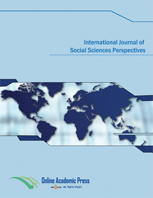Monetary – Fiscal Policy Mix: A Tool for Economic Stabilization in Nigeria
DOI:
https://doi.org/10.33094/7.2017.2020.61.11.29Keywords:
Monetary-Fiscal policy mix, Economic stabilization Nigeria.Abstract
The study examined empirically the relationship between monetary-fiscal policy mix and Nigeria’s economic stability. The Johansen co-integration technique complemented with VECM were employed to achieve the objective of the study. The result of the descriptive statistics revealed that the variables were normally distributed and the degree of variability of them was good as evident from the Jarque-Bera statistics and standard deviation. The Johansen and Juselius co-integration results revealed that both the trace statistic and maximum Eigenvalue statistic confirmed the existence of co-integrating equations among the variables of interest. It was evident that the trace test indicated six co-integrating equations while maximum Eigenvalue test revealed four co-integrating equations in the model, as the null hypothesis of no co-integration was rejected. These results suggested that there was a unique long run equilibrium relationship among the variables. The VECM result indicated that there was a long run relationship between the variables concerned. The result further showed that monetary-fiscal indicators have not made much significant contributions to the growth of the Nigerian economy as well as economic stabilization in Nigeria. The study recommended the entrenchment of fiscal discipline as a result of destabilizing effect of government’s fiscal activities due to its fiscal irresponsibility in Nigeria. Also recommended was that monetary policies should be structured to lower lending interest rate and raise interest rate on saving deposits so as to increase the availability of loanable funds which will in turn boost investment and stimulate economic growth.




